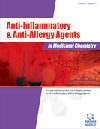-
f Anti-inflammatory Action of Green Tea
- Source: Anti-Inflammatory & Anti-Allergy Agents in Medicinal Chemistry, Volume 15, Issue 2, Aug 2016, p. 74 - 90
-
- 01 Aug 2016
Abstract
Background: Green tea has been shown to have beneficial effects against a variety of diseases such as cancer, obesity, diabetes, cardiovascular disease, and neurodegenerative diseases. Through cellular, animal, and human experiments, green tea and its major component, epigallocatechin-3-gallate (EGCG) have been demonstrated to have anti-inflammatory effects. Our previous findings have indicated that green tea and EGCG suppress the gene and/or protein expression of inflammatory cytokines and inflammation-related enzymes. Methods: Using bibliographic databases, particularly PubMed (provided by the http://www.ncbi.nlm.nih.gov/pubmed, US National Library of Medicine, National Institutes of Health, United States), we examined the potential usefulness of green tea/EGCG for the prevention and treatment of inflammatory diseases in human clinical and epidemiological studies. We also reviewed results from cellular and animal experiments and proposed action mechanisms. Results: Most of the results from the human studies indicated the beneficial effects of green tea and tea catechins against inflammatory diseases. The cellular and animal studies also provided evidence for the favorable effects of green tea/EGCG. These results are compatible with our previous findings and can be largely explained by a mechanism wherein green tea/EGCG acts as an antioxidant to scavenge reactive oxygen species, leading to attenuation of nuclear factor-κB activity. Conclusion: Since green tea and EGCG have multiple targets and act in a pleiotropic manner, we may consider their usage to improve the quality of life in patients with inflammatory disease. Green tea and EGCG have beneficial health effects and no severe adverse effects; however, care should be taken to avoid overdosage, which may induce deleterious effects including hepatic injury.


